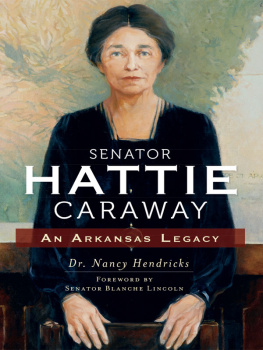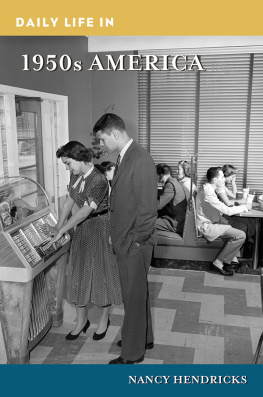
Published by The History Press
Charleston, SC 29403
www.historypress.net
Copyright 2013 by Dr. Nancy Hendricks
All rights reserved
Front cover: U.S. Senate Collection.
Unless otherwise noted, all images appear courtesy of the author.
First published 2013
e-book edition 2013
Manufactured in the United States
ISBN 978.1.62584.035.6
Library of Congress Cataloging-in-Publication Data
Hendricks, Nancy.
Senator Hattie Caraway : an Arkansas legacy / Dr. Nancy Hendricks ; foreword by Senator Blanche Lincoln.
pages cm
Includes bibliographical references and index.
print edition ISBN 978-1-60949-968-6
1. Caraway, Hattie Wyatt, 1878-1950. 2. Caraway, Hattie Wyatt, 1878-1950--Influence. 3. Women legislators--United States--Biography. 4. Legislators--United States--Biography. 5. United States. Congress. Senate--Biography. 6. United States--Politics and government--1919-1933. 7. United States--Politics and government--1933-1945. 8. Arkansas--Politics and government--To 1950. 9. Arkansas--Biography. I. Title.
E748.C228H36 2013 328.73092--dc23 [B]
Notice: The information in this book is true and complete to the best of our knowledge. It is offered without guarantee on the part of the author or The History Press. The author and The History Press disclaim all liability in connection with the use of this book.
All rights reserved. No part of this book may be reproduced or transmitted in any form whatsoever without prior written permission from the publisher except in the case of brief quotations embodied in critical articles and reviews.
CONTENTS
U.S. Senate Collection.
FOREWORD
During Womens History Month of 2005, I had the honor to stand before the United States Senate in tribute to a very special woman, Hattie Ophelia Wyatt Caraway. On January 12, 1932, this Arkansan became the first woman ever elected to the Senate.
When I think of the life of Hattie Caraway, I think of a life devoted to the family, state and country that she loved so deeply. Those who knew her were drawn to her endearing sense of humor, her gentle and dignified manner and her warmth. The example she set, both personally and professionally, has always been an inspiration to me. As the second woman to serve Arkansas in the U.S. Senate, I felt a special bond with Hattie and was humbled to follow in her footsteps.
Though she first came to the Senate following the death of her husband, a historic election allowed her to achieve what no woman had ever achieved: an elected seat in the U.S. Senate. It was not only a testament to the open-mindedness and fairness of the people of Arkansas but also to the kind of woman Hattie Caraway was.
With a firm belief that the time has passed when a woman should be placed in a position and kept there only while someone else is being groomed for the job, she stood boldly in the face of overwhelming odds to campaign for a full Senate term. During the 1932 campaign with the flamboyant Huey Long barnstorming the state on her behalf, Depression-stricken Arkansans who were enduring unemployment, poverty and low farm prices began to see Hattie Caraway for who she was, an honorable friend and neighbor who would remain their advocate. At the polls, the people of Arkansas stood by Hattie in overwhelming numbers, doubling the votes of her nearest rival and carrying sixty-one of Arkansas seventy-five counties. Then in 1938, she made history again by becoming the first women to be reelected to the Senate.
Certainly, it was rare for Silent Hattie to participate actively in debate or deliver a speech to the chamber. She was weary of politicians who placed a higher priority on hearing their own voice than working on behalf of the people they were elected to represent, once remarking, Its funny how they talk on after weve all made up our minds. Senator Caraway took her responsibilities as a legislator seriously and built a reputation among her colleagues as a woman of integrity who showed a determination to faithfully champion the interests of Arkansas above everything else.
Although she passed away in 1950, her impact is still felt in the institution she served and by all of us who found inspiration in the life she led. Her lasting legacy lives on in those who areand who will beinspired by her example to follow the road she so boldly paved.
When I had the honor to serve in the Senate, the nine female senators all contributed to a book called Nine and Counting, which was published in 2001. As optimistic as we were, did we really imagine that within slightly more than a decade, there would be twenty women of the Senate, as there are today?
Hattie would be proud.
It is up to us to continue the progress she made and to urge a new generation to follow the heroic example set by her and so many other pioneering women. When I think of Hattie Caraway, I think of a quote that I carried with me throughout my first Senate campaign: If I can hold on to my sense of humor and a modicum of dignity, I shall have a wonderful time running for office whether I get there or not.
Well, Hattie, you got there. In the process, your humor carried you through and your dignity earned you the affection of generations who are inspired to follow in your footsteps. Despite whatever barriers that those of us who followed may encounter or traditions that we must overcome, each of us has what Hattie did nota woman who led the way. That womans name is Hattie Caraway.
I am proud that she is from my home state of Arkansas, and I am proud to call her one of my heroes.
Senator Blanche Lincoln
ACKNOWLEDGEMENTS
Sincere thanks to:
Dr. Brady Banta, Archivist, Arkansas State University Archives and Special Collections
Jimmy Bryant, Director of Archives and Special Collections, University of Central Arkansas
Amy Elizabeth Burton, Assistant Curator, United States Senate
Malissa Davis, Library Technician, Arkansas State University Archives and Special Collections
Mrs. Betty Caraway Hill
Representative Donna Hutchinson
Dr. Betty Koed, Associate Historian, United States Senate
Senator Blanche Lambert Lincoln
Julie MacDonald, Curator, Arkansas State University Museum
Heather Moore, Photo Historian, U.S. Senate Historical Office
Christen Thompson, Commissioning Editor, The History Press
AUTHORS NOTE
Singing the Praises of Silent Hattie
Hattie Caraway has been part of my life as long as I can remember. My father knew her during World War II and shared stories of the first woman elected as a U.S. senator, serving from 1932 to 1945. Along with touching personal anecdotes, such as how she took the time to help find his lost air force ring and to learn about his hometown of New York City, he stressed what an accomplishment it was for her to be the first woman electedand reelectedto the United States Senate.
But I never truly understood the enormity of her achievement until entering public service myself with Texas governor Ann Richards more than a half century later. Even at the dawn of the twenty-first century, a woman in politics was not an easy role. Caraway may have been called Silent Hattie, but I knew I wanted to help sing her praises.














